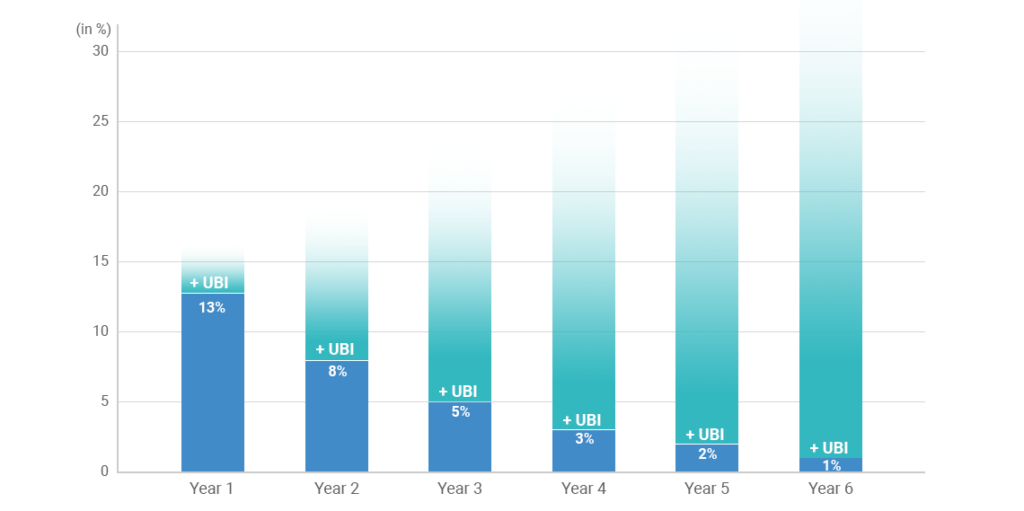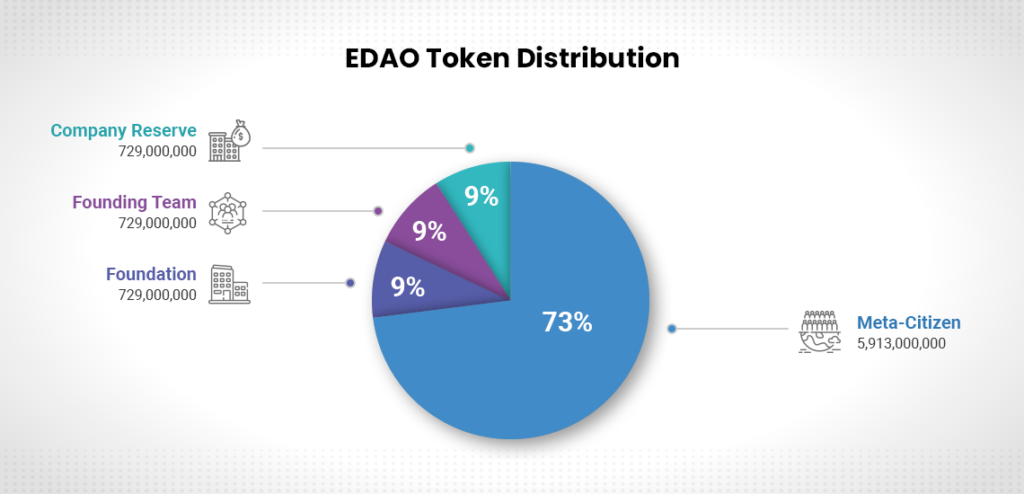What is an EDAO token and how will it be used in the YED?
EDAO tokens are ARC-20 governance and utility tokens in the YED metaverse. Holders of EDAO tokens will be able to claim privileges and rewards in the following ways:
- actively participating (e.g. trading, voting, development work, contributing, etc.) to receive rewards from the entire ecosystem fee collected in the UBI pool;
- trading on the Acent DEX; and
- participating in the key governance voting system of the YED.

In the future, EDAO will be listed and tradable on the Acent Swap DEX. EDAO grants the user the ability to participate in ecosystem governance while receiving some portion of ecosystem revenue back to the user. However, EDAO cannot be used as cash to purchase or sell a specific digital asset comparable to a cryptocurrency.
The following are specifics regarding the EDAO tokens’ benefits for users:
- Acent Mining
EDAO holders can mine Acent through the soon-to-be released pledging system for EDAO. For more details and information on the timing of the activation of the pledging system, please visit Chapter VIII of this document about the roadmap. Users who pledge their EDAO will be able to participate in a variety of ecosystem governance and functionalities.
The main goal of the UBI pool is to incentivize and encourage the community to start developing applications on the metaweb to be able to do business and earn token rewards for their participation. More YED businesses are expected to flourish in the Acent blockchain metaweb as we fulfill the social value of allowing everyone to benefit from a fairly designed shared ownership of all financial activity within the YED alternative reality web service. As more people pledge their EDAO tokens, more $ACEs are distributed from the UBI pool. This is expected to increase the interest in the $ACE ecosystem, resulting in sustainable funding and trade volume for the building of the metaweb. As the metaweb becomes more widely adopted through dynamic incentivization, the Acent mining UBI rewards are designed to increase over time.

Governance
With EDAO, holders can exercise their voting rights on the YED platform. This includes important matters such as foundation grant attributions with regard to content or creation of several features in the YED platform, including prioritization or inclusion of some important activities in the YED roadmap. Other governance benefits of the EDAO include:
- the ability to submit proposals that could affect the governance of the YED platform; and
- the privilege of reviewing and commenting on the DAO proposals submitted by the members of the community on the YED platform.
There will be 8.1 billion total EDAO tokens available (representing the UN projection of the world’s population by 2025). This is to quantify the value of EDAO as the unit of measurement for the value of monetized creativity, self-governance, and economic power a single person can have on the metaweb. In other words, whatever EDAO is worth, it will be priced as the equivalent of how much creativity, financial potential, and political intelligence an average human being represents. Its token distribution is as follows:

Take note that the proportion of EDAO tokens that are distributed to the Foundation and the Founding team will remain fixed at 9% for the foreseeable future. This is done to ensure the long-term viability of groups that advocate for and put into practice the principles of UBI, open-source metaweb development values, and decentralization. The Founding Team will take on the role of a core team that will carry on with the mission of making the decentralized immersive web a mainstream social infrastructure. On the other hand, the Foundation will see to it that the DAO proposals that have been put forward by the YED community are implemented.
The rest of the EDAO tokens, or 73% of its allocation, can be mined gradually through land sales and Acent pledging. When all 5.913 billion EDAO tokens have been distributed, there will be no more mining of EDAO. Nonetheless, Acent pledgers and land owners can still continue receiving governance and other rewards tokens of essential infrastructure assets such as decentralized ads, DAO proposed innovations, and first party applications such as metamail and messenger services. These initiatives may also be proposed through the DAO.


